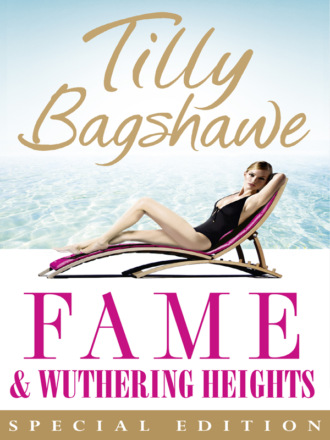
Полная версия
Fame and Wuthering Heights
‘Of course,’ said Ed. ‘We’re grateful you could fit us in. Aren’t we Sabrina?’
Slowly, with a melodramatic flourish worthy of Zsa Zsa Gabor, or a young Joan Collins, Sabrina removed her sunglasses, folded them neatly and laid them down on the table. She looked at Dorian Rasmirez, her eyes crawling over his face with disdain. It was the sort of look an empress might give to an unkempt page boy. Who the hell did he think he was, showing up late then ordering food without even asking her what she’d like? Presumptuous jerk. She turned to a passing waiter. ‘I’ll have a sour apple martini please, not too much sugar. And the lobster. And I’d like to see the menu again, please. I haven’t quite made up my mind about an appetizer. You can cancel the earlier order.’
‘Of course, Ms Leon,’ muttered the waiter. ‘Right away.’
Dorian watched this little charade with a combination of irritation and amusement. So the stories are no exaggeration. She really is a little madam. So much for rehab having humbled her. No wonder her manager looked as if he was one Big Mac away from a fatal coronary. Working for Sabrina Leon had clearly driven him to the brink.
The rumours about Sabrina were true in other areas too. Dorian had worked with some of the most beautiful actresses in the world, but few of them could match the electricity that positively crackled out of this girl. Electricity was good. Attitude, on the other hand, was bad, and Dorian had no intention of standing for it.
Leaning forward over the table, so that his face was only inches from Sabrina’s, he said very quietly, ‘You have fifteen seconds to cancel that order.’
Sabrina refused to be intimidated. ‘Or what?’ she taunted.
‘Or you are off my movie,’ Dorian smiled sweetly. ‘Entirely your choice, of course. But I don’t work with prima donnas.’
‘Is that so?’ Sabrina stood up haughtily. ‘Well, it just so happens I don’t work with megalomaniacs. Goodbye, Mr Rasmirez.’
‘Goodbye, Miss Leon.’
Poor Ed Steiner was so panicked he looked as though he were about to spontaneously combust. ‘Hey, hey, come on now guys. Let’s cool things down, shall we? No need to get into the Cuban Missile Crisis before we’ve even been introduced.’ He put a restraining hand on Sabrina’s arm. ‘How about we start this again? Dorian Rasmirez, Sabrina Leon. Sabrina Leon, Dorian Rasmirez.’
Neither Sabrina nor Dorian moved a muscle. After a few, tense seconds, Sabrina caved first, grudgingly extending a hand. Dorian hesitated, then shook it.
‘Sit down please.’
Ed shot Sabrina a pleading look. She sat.
‘I’m a fair man, Miss Leon,’ said Dorian. ‘I have nothing against you personally. Nor do I have any interest whatsoever in your personal life.’
‘I should hope not,’ Sabrina bridled.
‘However, I should tell you that the moment your personal life intrudes on the set of my movie, or impacts my cast and crew in any way, you will be out of that door so fast you won’t know what hit you.’
Sabrina opened her mouth to speak but Dorian held up a hand for silence.
‘I’m not finished. You’re a good actress, Sabrina. You have potential to be a great actress. But you’re also spoiled, immature, and at times breathtakingly stupid.’
Sabrina bit her lower lip so hard she drew blood. Not since Sammy Levine the youth theatre director back in Fresno had anyone spoken to her like this. All around their table, diners were straining their ears to hear her being ticked off like a naughty schoolgirl. It was mortifying.
‘None of the major studios will touch you,’ said Dorian. ‘Nor will any of the independent producers worth their salt. You’re a liability.’
‘That’s bullshit,’ spat Sabrina, unable to contain herself any longer. ‘I got offers.’
Dorian laughed brutally. ‘Thank God you’re a better actress than you are a liar. You have nothing, Sabrina. You know it and I know it. As of today, you are nothing. Now, if you want to become something again in this town, in this business, in this life, you’d better start by learning some humility.’
Sabrina’s blood boiled, but she said nothing. Dorian continued.
‘I’ve taken a chance on you young lady, when nobody else would. That’s the reality. I don’t need you. You need me. Which means that for the next year, or as long as it takes to get this movie pitch perfect, you do exactly as I say. You get up when I tell you to get up. You work when I tell you to work. You speak when I tell you to speak, you shut up when I tell you to shut up, and you eat whatever I put on your fucking plate. Are we clear?’
Sabrina glared at him in silent rage. He was right. She did need him. But in that moment she hated him more than she had hated anybody since the stepbrother who’d abused her as a kid.
‘Are. We. Clear?’ Dorian repeated, raising his voice so the entire restaurant could hear him.
‘Yes.’ Sabrina nodded, her voice barely a whisper.
‘I’m sorry. I didn’t hear you.’
‘Yes,’ she hissed. ‘We’re clear.’
‘Good.’ Dorian smiled broadly. ‘Now go ahead and cancel your order and we can get down to business.’
Nine hours later, Dorian pulled through the electric gates of his Holmby Hills mansion utterly exhausted. What a godawful day.
After lunch with Sabrina, he’d had back-to-back meetings with his manager, his accountant, and Milla Haines, his casting director on Wuthering Heights. He’d hoped that would be a short meeting, but Milla wanted to run through an agonizingly long list of possibles for the role of Hareton Earnshaw.
‘What about Sam Worthington?’ suggested Dorian.
Milla attempted an eyebrow raise, not easy with a forehead-full of Fraxel. ‘You can’t begin to afford him.’
Stick thin, perfectly groomed and of indeterminate age thanks to decades of surgical tinkering, Milla Haines was about as sexually alluring as a bag of nails. She was, however, a first-rate casting director, not to mention a straight talker. Dorian respected her.
‘Chris Pine?’ he asked hopefully.
‘If you wanted a solid second-tier-er, you shouldn’t have blown the budget on Hudson,’ said Milla.
‘That was money well spent,’ said Dorian firmly. ‘Viorel Hudson is Heathcliff. I couldn’t have done the film without him.’
‘You wouldn’t have had to,’ said Milla. ‘We’d have got him for half what you paid. Next time, let me do the negotiating.’
Dorian rubbed his eyes tiredly. ‘Let’s see the rest of the list.’
Years ago he used to find the early days of pre-production some of the most exciting, satisfying parts of his job, feeling his vision grow into reality beneath his hands, like a potter at the wheel. The screenwriter Thom Taylor once said that in Hollywood, ‘The deal is the sex; the movie is the cigarette.’ Dorian wouldn’t necessarily go that far, but it was true that the deals, plural – pulling together everything from funding to distribution to merchandising – was what made a movie real. Every waitress in town had an idea for a film, a dream that had brought them to this most brutal of towns. Being a producer as well as a director, you got to make your dreams come true.
This time, however, the excitement had been replaced by unadulterated anxiety. How the hell was Dorian – was anyone – supposed to be creative with so much financial pressure? He knew Milla Haines was right. He had overpaid for Viorel. What Milla didn’t know was that only two million of Hudson’s salary was being paid out of the official production budget. The other three million Dorian would have to find out of his own pocket. After the disastrous Sixteen Nights, he needed to blow the box-office roof off with Wuthering Heights. If he didn’t, he’d be ruined. It was that simple. He’d lose Chrissie. He’d lose the Schloss.
He tried not to think of how happy that would make Harry Greene. Twisted, delusional bastard. But it wasn’t going to happen. He’d been burned on Sixteen Nights, the movie Greene had helped bury, but with Wuthering Heights, Dorian had a new strategy.
Step one was to shroud the production in secrecy, to generate as much buzz and curiosity as possible. He was shooting the whole thing on location, far away from the Hollywood gossip machine. (Assuming they ever found a damn location. So far the expensive scouting firm he’d hired to find them somewhere in England had come up with sweet FA.) All the sets would be strictly closed. Everyone connected with the movie – cast, crew, even the accountancy staff – had been made to sign watertight confidentiality clauses and any actor or crew member who said so much as ‘good morning’ to a member of the press would be summarily fired.
Step two was to wait until all the creative work was done and shooting was almost wrapped, and then go looking for studio investment and a shit-hot distribution deal. By then, if the work was good, and it would be good, excitement about the film should be at its peak.
We’ll be fine, Dorian told himself. But his nerves persisted.
Parking his hired Prius out front (he’d had to sell the Bentley last year, a small contribution to the Schloss’s first winter heating bill), he staggered through the front door to the welcoming sound of a beeping burglar alarm. Dropping his bags he punched in the code to turn it off and almost went flying on the stack of unopened mail spilling all over the entryway floor like an oil slick.
‘Jesus Christ,’ he muttered, reaching for the light switch. Nothing happened. The bulb must have blown. A musty smell of dust and stale air assaulted his nostrils. No one had been here for almost a month and it showed. Dorian realized sadly that the tile-hung, Spanish-style estate no longer felt like home. He wondered if anywhere would ever feel like home again, then chided himself for being so maudlin. He was dog-tired, that was all. He needed to get into a hot shower, call Chrissie and collapse into bed.
The phone rang.
‘Rasmirez,’ he answered crossly. Who the fuck could be calling him at this time of night?
‘Wow, man, you sound like shit.’
Dorian grinned. ‘Thanks, Emil. I feel like it.’
Emil Santander, Dorian’s long-time friend and real-estate agent, sounded as upbeat and ebullient as ever. Emil and Dorian had been at film school together many moons ago, but their directorial careers had taken wildly different trajectories. Undaunted by his failure to become the new James Cameron, Emil had quit the business ten years ago, studied for his real-estate licence, and not looked back since, making a good, if unspectacular living selling the homes of his more successful classmates. He was just that kind of guy: upbeat, optimistic, uncomplicated. A dust-yourself-off-and-start-again-er. Dorian envied him.
‘It’s late, man,’ Dorian yawned. ‘I’m wiped out. Is this important or can I call you in the morning?’
‘It’s important,’ said Emil. ‘And, it’s good news.’
‘I could use some of that,’ said Dorian, wryly.
‘I got you a great offer!’
‘Oh.’ Dorian exhaled. This was unexpected. When he first left for Romania a year ago, he’d asked Emil to ‘keep his ear out’ for a potential buyer for the Holmby Hills house. But having heard nothing back, he’d forgotten all about that conversation. If Chrissie had the slightest suspicion he was even thinking of selling the place, she’d have sliced his balls off with a rusty penknife. As much as she had always bitched and moaned about LA, she adored their house, and had spent a not-so-small fortune renovating and decorating it to her exact specifications. But the reality was, if Dorian could achieve a good enough price for it, he would have to sell. At the rate the Schloss was eating money, not to mention his production debts, there was no way they could afford to run such a huge house in absentia.
‘Jeez,’ grumbled Emil. ‘Don’t overwhelm me with enthusiasm, will you?’
‘Sorry,’ said Dorian. ‘I’m just … how great, exactly?’
Part of him hoped the offer would be low enough to reject. Then he wouldn’t have to broach the subject of a sale with Chrissie, who was already spoiling for the next fight. But another, more rational part prayed it would be high enough to cover his debt on Viorel Hudson’s salary.
‘Pretty great actually,’ said Emil, unable to keep the triumph out of his voice. ‘About eight and half million bucks’ worth of great.’
Dorian quickly did the math. Eight five, minus four million mortgage, minus the lien he’d raised two years ago when Sixteen Days was going under, minus the excess on Hudson’s fee … he would break even, with a few hundred grand left over for a modest apartment in Santa Monica, somewhere to crash when he was working. Good news indeed.
‘That’s awesome, Emil. Thank you.’
‘You’re welcome. Now just to be clear, is that “Thank you, I accept the offer”? Because I’m bringing the paperwork round first thing tomorrow morning for you to sign. The buyers want to meet you.’
Dorian’s heart sank. ‘Tomorrow? Oh, jeez man, I’m flat out tomorrow. Can we do it later in the week?’
‘Helloo?’ said Emil. ‘Are you hearing me here, D? I just got you eight point five for a house that you and I both know is worth six on a good day. These guys are big fans of your work and they wanna meet you. Tomorrow.’
Dorian groaned. ‘OK.’
‘They’d also like to move in by the end of the week. I told them that shouldn’t be a problem.’
Fifteen minutes later, too tired to shower, Dorian lay back on his bed fully clothed. Feeling sleep start to creep over him, he quickly grabbed the phone and punched out his Romanian home number. He wouldn’t tell Chrissie about the house sale tonight. He couldn’t face the fireworks. He just wanted to hear her voice and to say good night. To tell her he loved her. And Saskia, of course.
The phone rang and rang … no answer.
That’s weird, thought Dorian. It was early morning over there, before six, but Chrissie was usually up at this time. She was fanatical about her sunrise yoga. He hung up and tried the line again, forcing images of Chrissie writhing naked in Alexandru’s arms out of his mind.
Still no answer. She must have gone out earlier than usual. Or maybe she’s in the shower already. Can’t hear the phone. I’ll try again in a few minutes.
He closed his eyes, just for a second. A movie reel of images danced through his brain.
Sabrina Leon, that beautiful, truculent child, her feline eyes glinting murderously at him across the table at Il Pastaio.
Chrissie, moaning with pleasure in some nameless lover’s bed.
Emil Santander handing him wodges of hundred-dollar bills, but as soon as the notes touched his hands they crumbled into dust, staining his fingertips ash-grey.
Harry Greene laughing.
At last the anxiety dreams faded and Dorian saw a house: grey, imposing, bleak, its shuttered windows being mercilessly lashed by rain. He recognized it instantly as the Wuthering Heights of his boyhood imagination. It was a forbidding building, cold and aloof, and yet to Dorian there was something wonderfully comforting about it, and about the lulling swoosh, swoosh sound of the rain as it fell, enveloping everything in a cool, grey shroud.
He was asleep, the phone still clasped in his hand.
CHAPTER SIX
‘Hey, Mum, guess what?’ It was the third time Abel Crewe had asked this question in the last minute. ‘If a dinosaur fell over, it would die.’
‘Would it?’ said his mother absently. ‘My goodness.’
Tish and Abel were in the back of a taxi, on their way home to Loxley from Manchester Airport. Tish’s eyes were glued to the familiar, craggy beauty of the landscape outside. She’d thought about it every day since she’d been away, but she realized now that she’d forgotten just how breathtaking the Peak District really was. This afternoon a light rain was falling, but a few pale sun rays fought their way bravely through the clouds, bathing the jutted tops of the Pennines in a soft, celestial light. With the exception of the odd crumbling farm-worker’s cottage, this stretch of the Hope Valley was devoid of buildings, and seemed barely touched by man. After the ugly urban sprawl of Oradea, it was a blessed relief for Tish’s senses, and she drank it in like a hummingbird gorging on nectar.
Abel, on the other hand, was far more interested in talking than sightseeing. If there were an Olympic team for not-drawing-breath, Tish’s five-year-old son would surely have been appointed captain.
‘Do you know why it would die?’ he asked, not bothering to wait for a reply. ‘Because dinosaurs are allergic to falling over. Like I’m allergic to mushrooms. What are you allergic to, Mum? Some people aren’t allergic to anything, also some animals aren’t, but some are, like monkeys. Not giraffes, though. Unless they ate a log. That would prob’ly get stuck in their necks and then … hey, look, another tractor! Seven! That’s seven, Mum! I’m gonna be seven, after I’ve been six. Where’s my birthday gonna be again? At home, or in In-ger-land? Can I have two parties?’
‘England,’ corrected Tish, who was only half listening. ‘Not Ing-er-land. Try to stop talking just for a few minutes Abi, OK? We’re almost there.’
The taxi took a left turn and the road narrowed sharply as it climbed and weaved its way around the hillside. Occasional farms gave way to grey stone houses, their walled front gardens bereft of flowers other than the occasional early snowdrop bravely rearing its flimsy white head above the muck. This was the outskirts of Loxley village. Tish felt her heart soar as they passed each familiar landmark: Bassets Mill, Mr Parks’s farm, the abandoned dovecote that the local children used as a makeshift climbing frame-cum-treehouse. A few moments later and they were in the village proper.
A five-times-winner of Britain’s Best Kept Village competition, Loxley was small but perfectly formed. It had a triangular green that was bisected by a tributary of the Derwent, which villagers had crossed for centuries by means of a Saxon stone footbridge. On one side of the green stood the post office and village shop. On the other was the perfectly preserved Norman church, St Agnes’s, and on the third, the focal point of all village life great and small: The Carpenter’s Arms pub.
‘What do you think, darling?’ Tish hugged her son excitedly.
‘It’s really pretty!’ Abel grinned. ‘It’s like a picture from my book.’ His sweet, snub nose was now glued to the window. Villages, apparently, were a lot more interesting than fells. ‘Is it a park? When does it close?’
Tish squeezed his hand. ‘It never closes.’
‘Never? Cool! Can we go in that shop? Do they have M & Ms? Do they have Lego?’
The taxi continued through the village and down a gentle escarpment, Abel chattering excitedly all the while. The lane narrowed to a single car’s width, hemmed in on either side by thick bushes of dog rose and briar, so it was almost like driving through a tunnel. Then suddenly, without warning, the valley opened up again to breathtaking views. A few hundred yards further and the road abruptly stopped in front of a pair of lichened wooden gates, propped open with two stone saddle stools. Through the gates, a wide, sweeping driveway wound its way into the distance, looking for all the world like the entrance to some enchanted land.
‘It’s a palace!’ gasped Abel, his eyes on stalks. ‘Who lives up there?’
‘We do.’ Tish laughed as the taxi pulled through the gates. ‘For a little while, anyway. The house actually belongs to your Uncle Jago –’ the words stuck in Tish’s craw–‘but he’s away at the moment. Mummy’s friend Mrs Drummond has been looking after it for him while he’s gone, and we’ve come to help her.’
This seemed to satisfy Abel, who was more interested in the oak trees in the park and which of them might be most suitable for his planned Tarzan treehouse than Loxley’s complex ownership structure. In-ger-land, he had already decided, was infinitely superior to Romania. He hoped his Uncle Jago’s holiday lasted a long, long time.
He hoped it even more when he saw the house, a turreted, Disney fairytale that was just crying out for someone to play knights in it. While Tish paid the cabbie and struggled to drag her suitcase across the gravel, Abel raced ahead of her, bounding up the stone steps through the open front door.
A plump, elderly woman, wearing a striped apron over her gardening trousers and sweater, appeared in the hallway.
‘Who are you?’ Abel asked bluntly.
‘I’m Mrs D,’ said the woman, smiling as she wiped her floury hands on her apron. ‘Who are you?’
‘I’m Abel Henry Gunning Crewe,’ said Abel. ‘Do you like dinosaurs?’
Before she had time to answer, Mrs Drummond saw Tish lugging an enormous suitcase into the hallway. ‘Darling! Let me help you.’ She relieved Tish of the case, plonking it down at the foot of the stairs, and threw her arms around her former charge, enveloping Tish in a bosomy, cinnamon-scented bear hug. ‘I can’t tell you how happy I am to see you.’
‘You too, Mrs D,’ said Tish with feeling. ‘You met Abel?’
‘I did indeed,’ Mrs Drummond grinned, turning to watch the little boy who was now mountaineering his way up the banisters. ‘He’s gorgeous.’
‘Isn’t he?’ Tish grinned back. ‘I thought he’d be tired after the flight and everything, but he hasn’t stopped talking since six o’clock this morning.’
‘Not to worry,’ said Mrs Drummond. ‘I’ve made some cinnamon pound cake. A couple of slices of that will take the wind out of his sails. Now, what would you like to do first, lovie? Eat? Have a bath? Unpack?’
‘No,’ said Tish resolutely. ‘I’d like to meet our house guests.’
A cloud of anxiety descended over Mrs Drummond’s kindly features. ‘I don’t think you should do that right away, Letitia. They’re not very nice people. Wait till this afternoon and I’ll get Bill and one of the other farm boys to go in there with you. They mostly keep to the East Wing, so they shouldn’t bother us here.’
‘Nonsense,’ said Tish. ‘I don’t need a bloody bodyguard in my own house. If you’d take Abel and get him something to eat, I’ll go and sort them out.’
‘I really don’t think you understand, darling …’ Mrs Drummond began. But Tish was already marching off down the hallway towards the East Wing. She always was a stubborn child, thought Mrs Drummond, watching her retreating back. Perhaps she should call Bill Connelly, just in case.
Walking down the East corridor, past Loxley’s grand, formal rooms, Tish gasped in horror as the extent of the damage wrought by Jago’s ‘friends’ unfolded. Every few feet, dark rectangles of wallpaper revealed the places where paintings had been removed and, according to Mrs Drummond, taken to London to be sold for drugs. In the library, antique bookcases stood with their doors hanging off the hinges and an array of beautifully bound first editions spilling out onto the floor. In the grate, Tish saw torn spines and singed pages: some Barbarian had used her father’s books as kindling! Everywhere there was dirt, Persian runners covered with the imprints of muddy boots, empty mugs and glasses littering every available surface, some of them growing livid green mould on the dregs of whatever vile, stagnant liquid they had once contained. The deeper Tish walked into the East Wing, once the most impressive part of the house, the more the place looked like a squat, littered with empty beer cans and overflowing ashtrays.
Finally, she approached the drawing room. There was music coming from inside – Jimi Hendrix, if I’m not mistaken – and raucous, male laughter. Her hand was on the door handle, but she hesitated.
Not yet, she thought. There’s something I have to do first.
In the kitchen, Mrs Drummond watched in awe as Letitia’s son inhaled his fourth, slab-sized slice of cinnamon pound cake. The child was an eating machine. And he was still talking.
‘If you could make dinosaurs un-extinct and have one for a pet, which one would you have?’ he mumbled through a fine spray of cake crumbs.
‘My goodness, Abel. I’ve never really thought about it. I don’t suppose I’d have any of them. Would dinosaurs make good pets, do you think?’
Abel looked at her pityingly. ‘Of course they would. A T-Rex would be the most excellentest pet you could ever have, and do you know why? Because it would kill all the baddies, and eat them, but it wouldn’t kill you because you’d be its owner. Pets’ owners are kind of like their mum or dad. So pets actually love them. Even a T-Rex would love its owner, but you’d have to help it not to fall over, because do you know what happens to dinosaurs when they fall over?’











